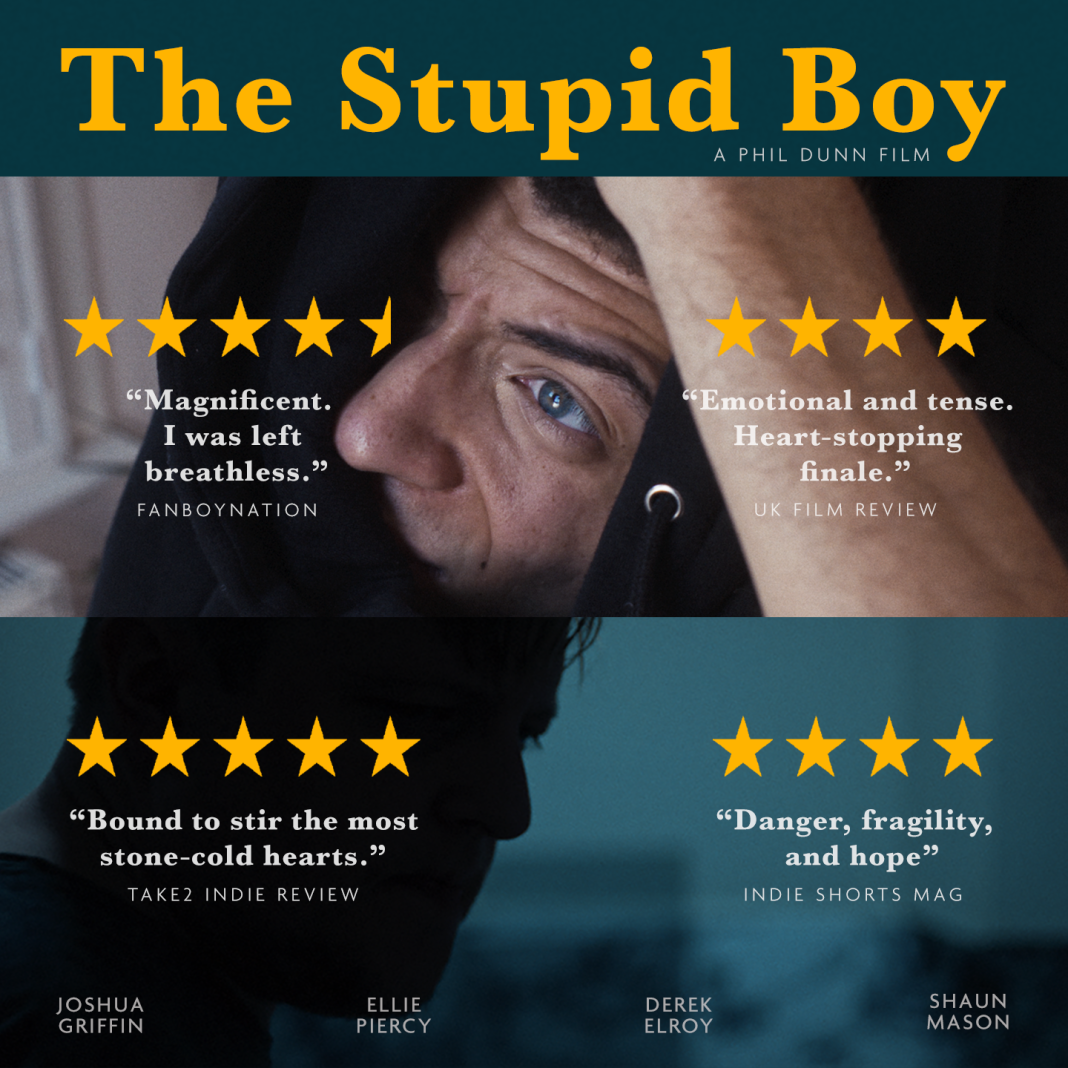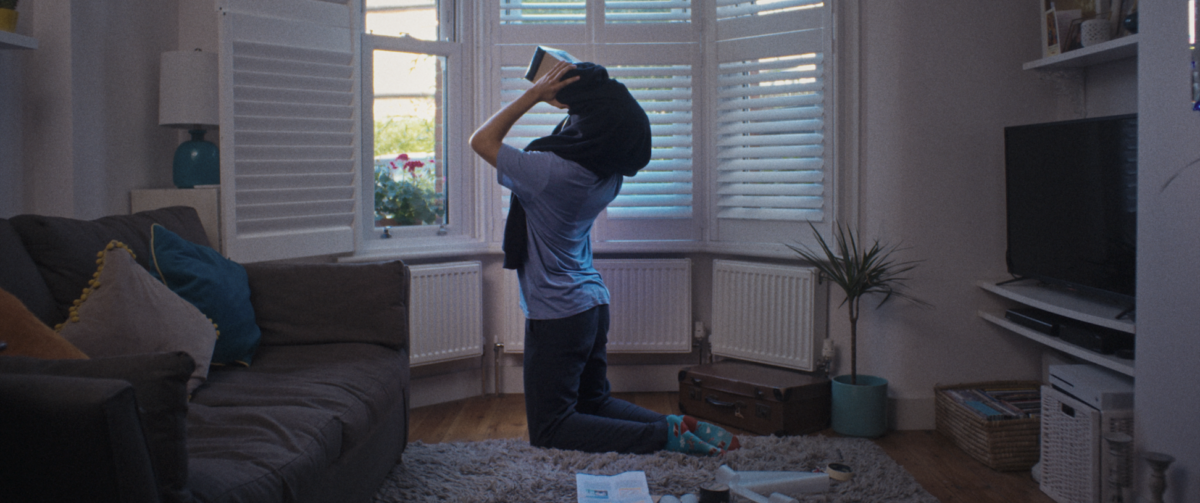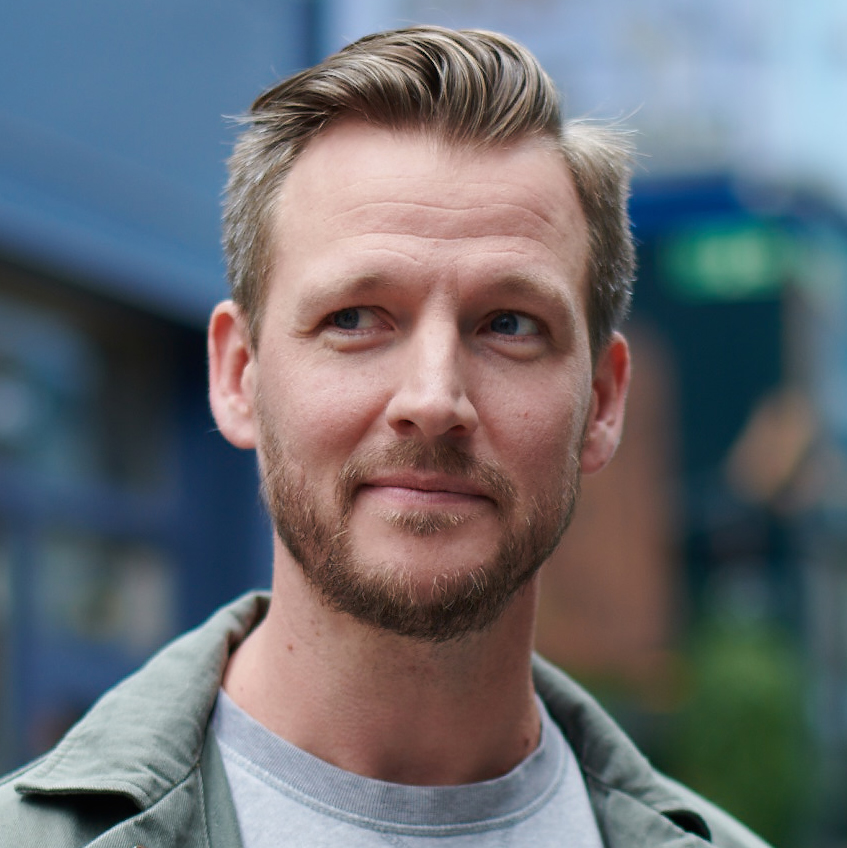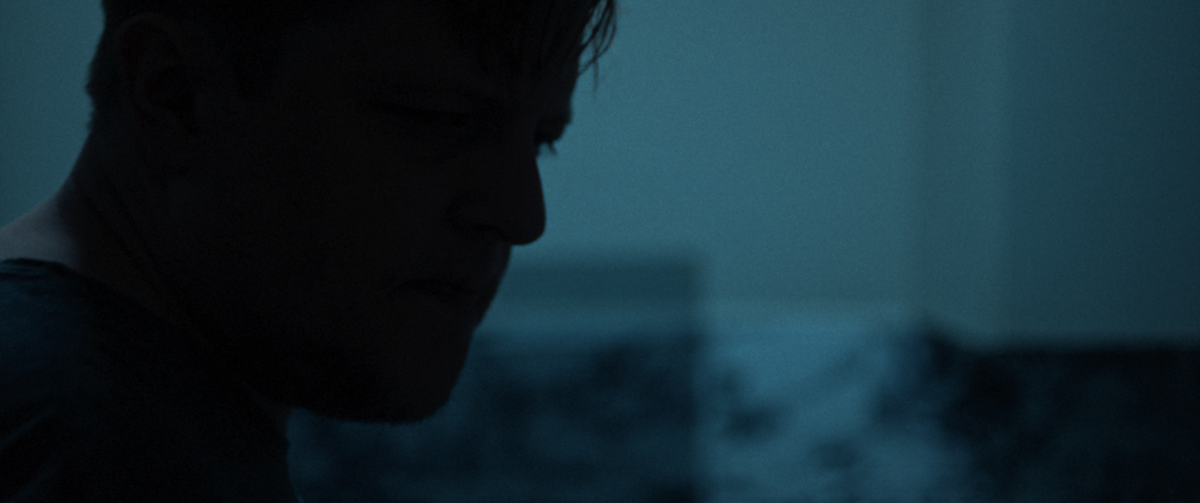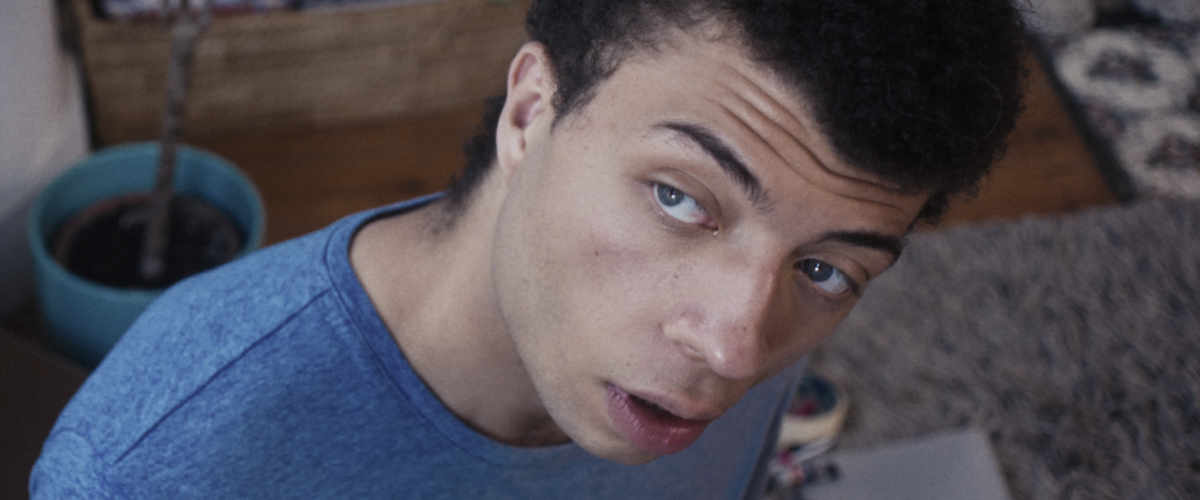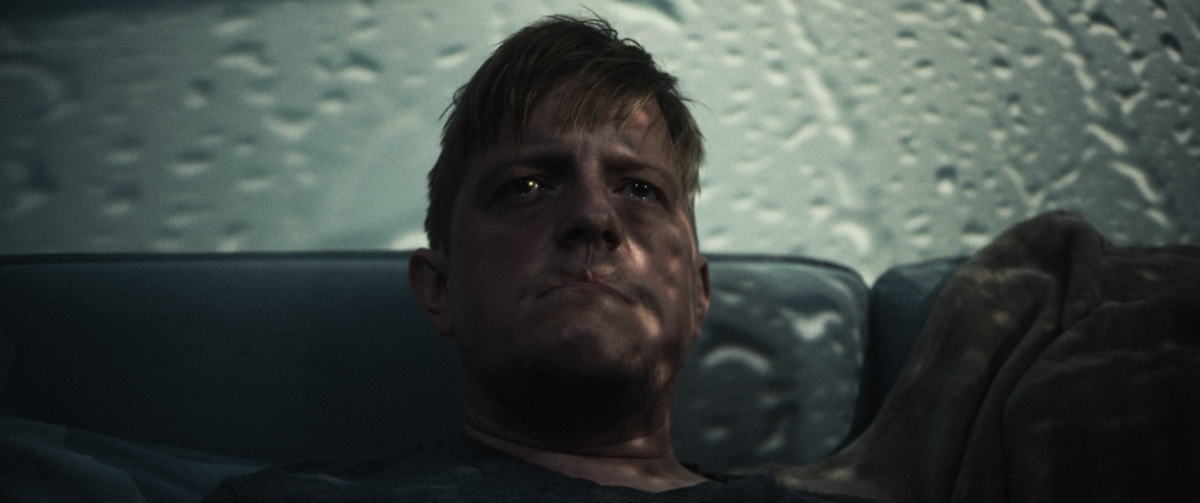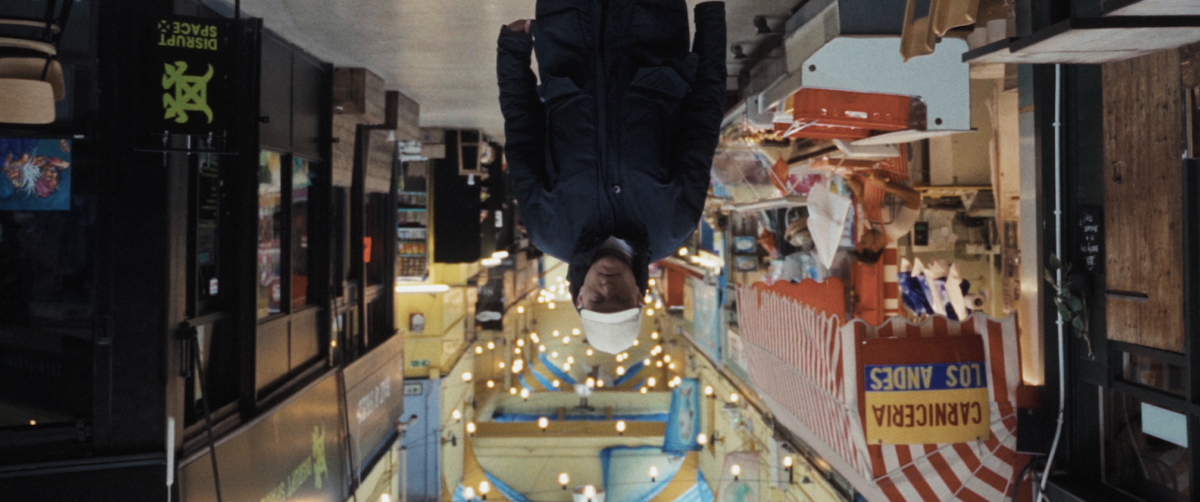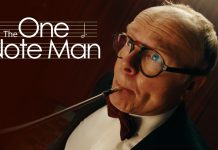Phil Dunn’s short film THE STUPID BOY explores the inner and outer conflict of a mentally-challenged man.
Film And TV Now spoke with the film-maker about the short:
This is a very thoughtful film about perception. What was the start off point for the script?
Thank you. The starting point for the script was the final scene. I knew I had to get to that moment and that it needed it to be completely believable for it to work.
So the main work of the writing was building the characters to be tbree-dimensional and credible, so that we are really in that final moment with them.
The mental health issues are at the forefront in this. What were the key challenges in achieving a balance?
Yes, the title kind of puts mental health on the agenda right from the start – it sounds like an insult; the kind of thing that would affect someone’s mental health, and it’s attacking someone’s mental capacity.
It gives us a question: who is The Stupid Boy? – who is calling him that, and why? Dostoevsky did the same with his book The Idiot, which is a big inspiration for me.
And, absolutely, balance was really critical. It needed to be a knife edge, and took a lot of work. For Stephen, the bomber, we needed to see how someone might end up committing such a terrible act, and to be able to somehow empathise with that, whilst also being clear that it’s awful and incredibly sad that someone could get to that point. We needed to get some understanding of his background, his upbringing – the things that caused his brokenness.
Below: Director Phil Dunn.
For Michael, he had to be innocent and naive (in a good way) and yet obviously not “stupid” at all. Right from the start, he is seen creating a camera obscura and then doing maths equations. But he is bullied because of his naivety and trusting nature.
He also needed to be aware of the bullies and the hatred in the world and yet, he doesn’t seem to read those things in the way that the rest of us might. Is that a weakness, or actually a gift? We needed to see his family life and how he might get to a point of daring to act on his gift, having been nurtured in a loving environment.
So who is “The Stupid Boy”? The bullies might be calling Michael “stupid”… Stephen’s father might have called him “stupid”… Do we think that either of them are stupid? Is Michael’s final act in the film “stupid”?
Tell us about your cast.
Casting for this film was so important. It’s the kind of story that could easily not work if just one part of the puzzle was out of place. So we were really careful with our casting phase, and I am so pleased that we ended up with such strong performances across the board. I warn you now, I could talk about each of the actors at length – they are all so good!
Joshua Griffin, who plays Michael, is clearly a rising star – one to watch for sure.
When we cast him, it was only his second or third short film. We considered a lot of people for the role, and Joshua made the shortlist (before we asked for tapes) because he is neurodivergent himself and that was on his casting profile. We were really aware that if we were casting a neurodivergent role, then we should try to get someone who might be so themselves.
When we got the self-tapes through, it was obvious the difference that that made. Joshua’s performance stood out a mile, for all the amazing nuance he brought to the part – not just the line-delivery, but the subtle looks and mannerisms. He is dyspraxic and has ADD, so he is on the spectrum, but not as far along it as Michael is in the film. Joshua also has a cousin that he is close to who is autistic, so he was able to bring his experience with them to the role.
Shaun Mason was incredible as the bomber. He has tons of experience in great TV shows and films, but he brought such care, sensitivity and attention to detail to the part.
Ellie Piercy is an amazing actor – one of the best working in the UK at the moment, I think. She has such a deep approach to creating a character, so that you feel you are not watching her act at all, but rather seeing another person.
Considering I have known her for years, that is quite an incredible trick to pull off. She’s one to watch as well – currently in the film GOLDA with Helen Mirren.
Derek Elroy plays the father, Adio, and provides such an important bedrock for the character of Michael. What’s so amazing is that we had someone else lined up to play Adio in the film, but he got stuck in a travel quarantine the weekend before we were due to start.
Derek was next on our shortlist so we reached out to his agent and fortunately he was available. I got Derek on the phone and I could tell he immediately had a resonance with the part.
He told me later that it was so refreshing as a black man to be asked to play a loving, devoted father, compared with some of the castings he has been offered, and that’s what led him to jump on the role when we asked. When you watch him, you can see that coming through. It’s lovely.
Tell us about your production team.
Gabrielle Oliver is our Producer and she was totally outstanding on this. I have worked with Gabi for years on client work, but this was her first narrative short.
She totally knocked it out of the park. We built our team carefully over a few months and concentrated on getting as many people from Brixton (where our production company, Authentive, is based) and South London as possible.
We decided early on that we wanted the film to not just be telling a great story in front of the camera, but behind it as well. – We wanted everyone involved to feel valued and have a voice in the process. We wanted our film to give opportunities to local talent, particularly those from underprivileged and underrepresented backgrounds and we insisted on trying to pay as many people involved as possible.
One example was the runners – we had reached out to Brixton Youth Theatre for the casting, but we also then asked if any of their teenagers would want experience on set as a runner. We said we would pay them, which is unusual for runners on a short.
But only the privileged can afford to work for a few days without pay, so we offered pay so that someone who might otherwise have to pass in favour of paid work could gain experience in the film industry and get their foot in the door.
Where did you shoot and for how long?
In and near Brixton in South London. We got to shoot in 2 iconic Brixton locations: Brixton Village (for the final scene) which is one of my favourite places, and the legendary Dogstar pub on Coldharbour Lane (who were so generous and helpful!). It took 4 days in total.
Would you like to expand this short into a feature?
I am open to that, but I don’t have plans to at the moment. I am writing two other features and am more focussed on getting them made. I also have a short called FIRE LILY which is ready to shoot and needs money..!
But if someone was really interested in The Stupid Boy being expanded then I have plenty of material for it that I cut out of the script for the short. It was originally more like 35-40 mins long.
Who and what are your key cinematic influences?
Directors: Barry Jenkins. Sarah Polley. Paul Thomas Anderson. Martin Scorsese. Greta Gerwig. Wes Andersen. Terrence Malick. Michel Gondry…
Films: Magnolia, Thin Red Line, Women Talking, The Grand Budapest Hotel, Eternal Sunshine of the Spotless Mind, Road to Perdition, Blade Runner 2049 – anything with Roger Deakins on camera.
Did you rehearse much?
No we didn’t rehearse. Covid was still lingering and everyone had to test, so that made it harder to get together, but also I quite like using the takes to rehearse. Sometimes it just works straight away in the first take, and sometimes it takes 20 more attempts. I try to allow for that in the way that we work and schedule the days.
Who would you like to work with in the future?
Dreaming dreams? Viola Davis – I really want her to voice the poem in my short FIRE LILY – she would be perfect. More from the dream list: Joaquin Phoenix, Saoirse Ronan, Tom Hardy, Ben Whishaw, Idris Elba, Matthew McConaughey (my film about fathers has a part that I think he would nail!).
What issues and themes do you want to explore in future?
One of the feature films I’m writing is a comedy drama about addiction and belonging called N/A, and the other is a drama about one man’s struggle with the toxic legacy handed to him by his abusive father, called TIGER MOTH. So there’s some issues to be getting on with!
And my next short FIRE LILY is based on a poem I wrote in the days after George Floyd’s murder. It’s a super exciting collaboration with a Producer in LA, a Jiulliard dancer/actor in Cleveland and we’re aiming to shoot part of it in South Africa. It’s packed with issues and themes: racism, climate change, colonialism, consumerism, global health..!
I feel like my thing is to not shy away from big issues – to look them straight in the eye – but at the same time to attempt to draw a line of simple truth through the middle of them. The Stupid Boy feels like a good example of that.
Are there plans to show it to charities and political parties?
That’s a great idea! I have reached out to one person for a charity connection as I would love the film to do as much good in the world as it can. I also wondered if a charity like CHOOSE LOVE would be interested in it.. Political parties.. Wow. now there’s a thought…
How have you evolved as a filmmaker through this type of story?
I think that’s one great reason to make films – however they turn out, they will definitely make you grow as a filmmaker and as a human being.
For me, it definitely confirmed the kind of ethos I want to work with on set (creating a great story behind the camera as well as in front of it) and it’s made me want to be even more daring with my future work.
When I first thought of a film with a suicide bomber in it, in a public place, I thought I could never pull it off. Now that I have, I feel like I can remove more of the limits I have placed on my storytelling.
Making The Stupid Boy also taught me more about myself – so much of it came from parts of my own psyche, and when you suddenly have actors bringing that to life in front of you, you learn things about yourself that you couldn’t any other way. It has been such an important film for me personally.
What are your immediate festival plans?
It’s screening this week (until October 8th) at more than 500 venues worldwide to over 100,000 people as part of the Manhattan Short Film Festival. I still can’t believe that, and have been watching messages coming in from places like Belarus, Bermuda or Australia. It’s mad for a short film to be getting such exposure.
Other than that, we have festivals in Italy, Spain, California, Pittsburgh and London in the next month or so (you can see a list on www.thestupidboy.com). And then of course, there’s the OSCARs and the BAFTAs on the horizon… Crazy!
Finally, what are you most proud of about this short ?
That it’s moving people who watch it and that it seems to be finding its audience all over the world. It really seems to have a life of its own, and I’m along for the ride.
I am very proud that it says something simple and profound about love that challenges its audience to consider love’s power in their own lives, and how they might wield that power more in the world.
Please follow and like us:


